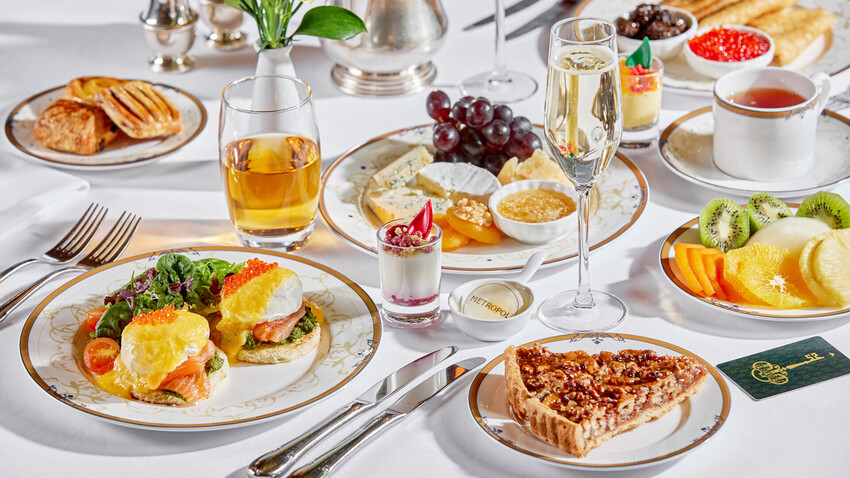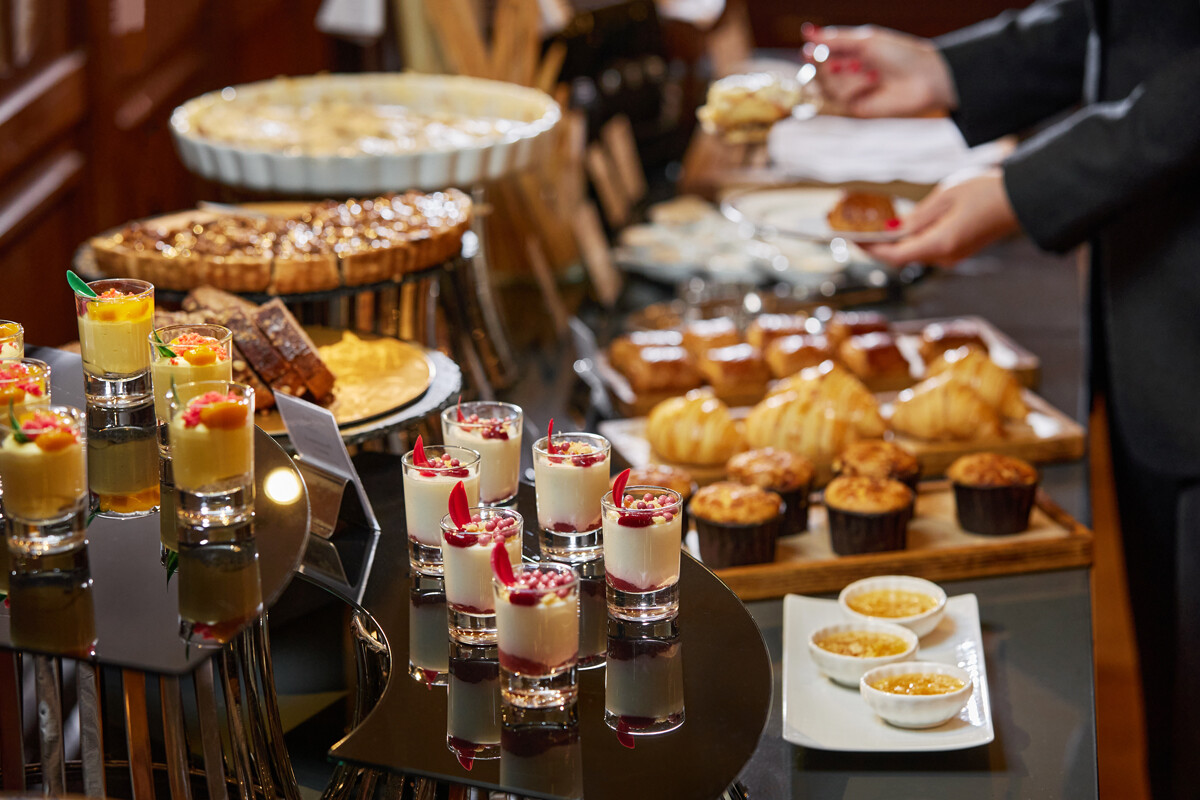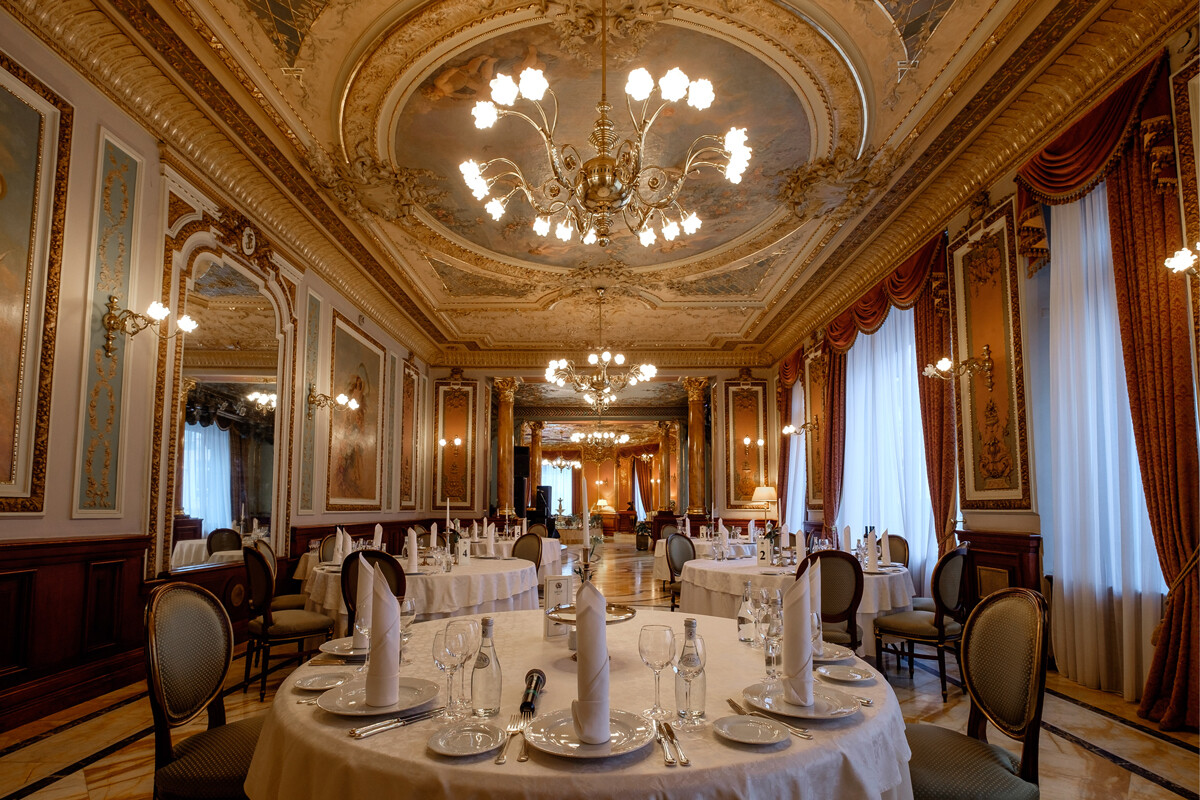
The oldest restaurant in Moscow was opened in 1826 on Kuznetsky Most by a Frenchman named Tranquille Yard, after whom it was named. The restaurant moved several times and finally found its permanent place on Leningradsky Prospekt in 1910.
‘Yard’ attracted the cultural elite with exquisite dishes performed by French chefs, luxurious interiors and gypsy singing. Poet Alexander Pushkin immortalized "truffles from Yar" in one of his poems. And bass singer Feodor Chaliapin, according to one legend, liked to come here on the eve of premieres at the Bolshoi Theater, sing from the balcony of the restaurant and then arrange debauch with visitors. The next day, the whole of Moscow was talking about him and provided him with a full house at the concert. You needn't worry about the integrity of the interiors; the restaurant had a separate price list for property damage and more: smearing mustard on a waiter's face cost 120 rubles and to throw a bottle at a Venetian mirror – 100 rubles.
There was an imperial lodge in the restaurant, however, the royal family did not visit it; however, their close friend Grigory Rasputin was a frequent guest, as well as writers Maxim Gorky, Alexander Kuprin and others.
After the 1917 Bolshevik Revolution the restaurant was closed and its building housed a movie theater, gymnasium, hospital and other institutions. In 1952, the ‘Sovietsky Hotel’ with the ‘Sovetsky Restaurant’ opened in the building. Joseph Stalin and his guests liked to visit it. The restaurant returned to its original name in the 1990s.
Nowadays, those dining at ‘Yar’ can still enjoy a meal in that very same imperial restaurant of the early 20th century: high 12-meter ceilings, stucco, gold leaf, a chandelier like in the Bolshoi Theater and a fountain on the summer veranda.
The menu includes Russian and European dishes: muksun ‘sugudai’ (a Russian fish dish originally from Siberia, Russia. It consists of pieces of raw fish, which are cut into larger pieces and then seasoned with salt, black pepper, lemon juice, oil or, optionally, vinegar, basil, dill), ‘Russian’ aka ‘Olivier’ salad according to a traditional recipe, ‘Old Moscow’ borsch with beef, a hot appetizer consisting of coquille with crab and sturgeon under cream-cheese sauce and traditional pirozhki (Russian baked buns with fillings).
Average check (per person): 2,500 rubles (approx. $27)
Address: Leningradsky Prospekt, 32/2, Hotel 'Sovietsky'

Breakfast.
Restaurant 'Metropol', Press SeviceThe restaurant opened in 1905 in a hotel with the same name in the very center of Moscow. The initiator of the construction was a millionaire named Savva Mamontov.
The hotel and restaurant with a French chef quickly became a place of attraction for celebrities and the wealthy. Everything was made according to the latest technology: special ovens for French breads, biscuits and Russian ‘rasstegai’ pies, refrigerators with ice makers, elevators and other know-how of the time. Not to mention the interior: a huge staircase, glass domes, stained glass windows and a marble fountain.

It was in this restaurant that poet Igor Severyanin wrote his famous poem ‘Overture. Pineapples in Champagne’ and Sergei Yesenin confessed his love to dancer Isadora Duncan. Later, in the second half of the century, world-famous cellist Mstislav Rostropovich and singer Galina Vishnevskaya would meet there. But, the history of Metropol is not only about abundance and love.
After the 1917 Bolshevik Revolution, the hotel, badly damaged by shelling, housed government agencies and officials, while part of the hotel turned into communal apartments. Revolutionary figures Vladimir Lenin and Lev Trotsky performed on the ‘Metropol’ stage. For a few decades, the restaurant lost its glamor, but continued to operate.
Now, the restaurant is fully restored and every guest can enjoy the decoration of the hall again, as well as European dishes in original execution and traditional Russian cuisine for breakfast, banquets or other important events. For example, on the ‘banquet’ menu, it is worth paying attention to the hot, smoked sterlet, fisherman's ‘ukha’ soup and ‘kulebyaka’ pie baked with three different fish fillings.
Average check (per person): 4,100 rubles (approx. $45)
Address: Teatralny pr-d, 2

Another restaurant in a hotel with the same name has been located near the Bolshoi Theater since 1913. In the beginning, the hotel was called ‘Berlin’ and the restaurant was called ‘Vienna Café’. When relations with Germany deteriorated during World War I, the name ‘Savoy’ appeared.
The main guests were Moscow’s bohemia – ballet dancers, journalists and writers. They enjoyed the paintings on the walls, the stucco, the golden mirrored ceilings and other luxurious elements. And, of course, a fountain with a marble bowl, created according to the project of Russian painter Mikhail Vrubel.
Representatives of Moscow’s golden youth would drink cognac and even ‘Veuve Clicquot’ champagne there, eat foreign dishes, listen to music and dance the nights away.
We advise guests today to try the seafood dishes: scallop ceviche with raspberry and truffle sauce, crab phalanges with stracciatella or trout dumplings with red caviar and Bisque sauce.
Average check (per person): 2,600 rubles (approx. $28)
Address: Pushechnaya Street, 6
4. ‘TsDL’ (‘Central House of Writers’)
In this museum-restaurant, from the entrance, you immediately get into the atmosphere of an vintage aristocratic mansion, where antique furniture and decor elements of the 19th-20th centuries have been carefully preserved. For example, the ‘Oak’ hall has two levels, stained-glass windows and a large crystal chandelier, while the ‘Fireplace’ hall has fireplaces from the 19th century.
The restaurant was opened in the 1930s, but it became especially popular in the 1960s, when young authors were allowed to write their poems on the walls. Poets Andrei Voznesensky, Robert Rozhdestvensky, Yevgeny Yevtushenko and others left their autographs there. They can still be seen in the ‘Pestry’ (‘Colorful’) hall.
When perusing the menu, you should try the pikeperch aspic (‘zalivnoye’), chicken pate in glazed apple, mushroom soup with barley, warm salad with eggplants and cream cheese, venison dumplings and ‘Pozharsky’ cutlet with potatoes and mushrooms; while, for dessert, leave some room for the ‘Kremlin syrniki’ and ‘Kiev’ cake with nut ice cream.
Average check (per person): 2,500 rubles (approx. $27)
Address: Povarskaya Street, 50/53 b1
Originally, a popular Moscow tavern that operated on the site of the current ‘Uzbekistan’ restaurant; later, a French cafe was opened there and, after the 1917 Bolshevik Revolution – an officer's canteen. After World War II, many republics of the USSR opened restaurants with their traditional cuisines in Moscow and, in 1951, the Uzbek Soviet Socialist Republic opened the restaurant ‘Uzbekistan’.
During the Soviet years, it was immensely popular: actors, singers and poets all liked to dine there. It was difficult for the ordinary public to get in, but many were content with ‘cheburek’ fried savory turnovers from the shop nearby.
In 1997, the restaurant was renovated, adding more oriental dishes, so now guests can fully enjoy comfortable sofas, carved furniture and handmade carpets.
The menu includes Uzbek, Pan-Asian and Caucasian dishes: pilaf, shashliks, ‘kazy’ (homemade horse sausage), ‘lagman’ noodles, flatbreads, ‘chebureks’, ‘samsa’ savory pastry and, of course, Uzbek tea from authentic drinking bowls, as well as oriental candy. All this is accompanied by a constant festive mood, which also includes live music and belly dancing.
Address: Neglinnaya Street, 29 b.5.
Average check (per person): 3,000 rubles (approx. $33)
Dear readers,
Our website and social media accounts are under threat of being restricted or banned, due to the current circumstances. So, to keep up with our latest content, simply do the following:
Subscribe to our Telegram channels: Russia Beyond and The Russian Kitchen
Subscribe to our weekly email newsletter
Enable push notifications on our website
Install a VPN service on your computer and/or phone to have access to our website, even if it is blocked in your country
If using any of Russia Beyond's content, partly or in full, always provide an active hyperlink to the original material.
Subscribe
to our newsletter!
Get the week's best stories straight to your inbox